
Announcements

Announcements
If you are looking for a study-abroad destination that is famous along with offering high-quality education, then you should consider programs available to Study in France for Indian Students. As per the latest statistics, it is the third most popular higher education location based on the number of applications it receives every year.
Studying in France can offer you the most unique study experience as it perfectly blends its culture & tradition with the 5-star rated education standards. Hence, such an approach ensures that in France along with quality education, you can also enjoy a quality living.
Also, the French government takes initiatives & introduces programs that attract international students & help diversify the French education system. The latest record reflects that around 370,000 international students are currently pursuing their higher education in France. Among all those international students, approx. 70% of the students attend state universities, due to the subsidised & affordable tuition fees along with quality education standards.
If you are interested to know more about how to Study in France then you should go through the below sections that cover every detail that you must be aware of.
If you plan to study in France, check out the key highlights below.
| Universities in France | 100+ |
| Average living expense | 700 to 900 Euros each month |
| Popular courses in France | Engineering, MBA, Hotel Management, Fashion design, Finance, Luxury Brand Management, etc. |
| Part-time work allowance | Up to 964 hours per year |
| France study visa costs | €50. |
Several reasons exist why France is becoming a preferred study-abroad destination for international & Indian students. Some of these reasons are:
The cost of living in France is affordable as compared to other European cities. However, if you are studying in France, then you must be aware of the overall cost involved which can help you plan your budget. Such a budget includes both the tuition fees as well as the cost of living. However, both costs vary based on several factors including the region you are staying in, the course/university selected & other associated factors.
However, you can have a brief overview of the cost of living and studying in France by checking out the below table.
The average study cost in France is briefed in the tabulated form below.
| Course Level | Average Fee |
|---|---|
| Bachelor's | From ₹ 0 to ₹ 25 L |
| Master's | From ₹ 0 to ₹ 1 Cr |
| Doctorate | No Fees |
NOTE : The cost of studying in France is zero because public universities there do not charge tuition fees, even for international students.
The average cost of living in France is tabulated below.
| Particulars | Average Monthly Cost in EUR | Average Monthly Cost in INR |
|---|---|---|
| Rental for 1 bedroom apartment | 550 | 37,603.50 |
| Basic Utilities (Electricity, Water, etc.) | 140 | 9,571.80 |
| Monthly Pass (Transport) | 48 | 3,281.76 |
| Telephone, Internet, etc. | 28 | 1,914.36 |
| Recreation | 100 | 6837.00 |
| Food and Drink | 145 | 9,913.65 |
Find the right path with Meridean
France is home to over 3,500 governmental and private colleges known as universities and Grandes Ecoles. According to the QS world ranking, France has 83 globally famous institutions for international students, with 37 of them ranking among the top universities in the world. France's top 10 universities and higher education institutions are listed below:
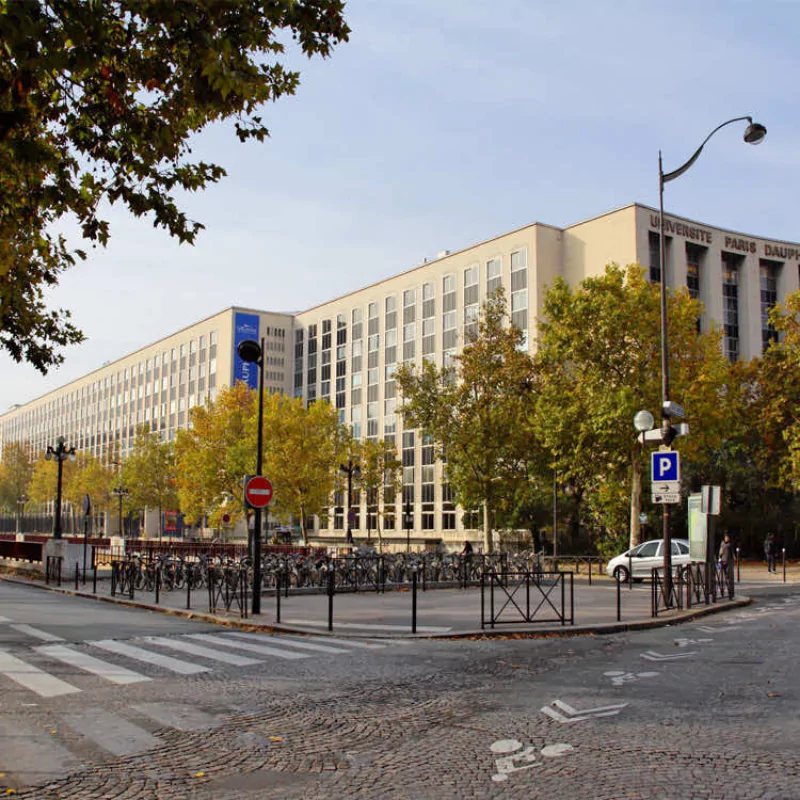
#24
QS World Ranking

#46
QS World Ranking
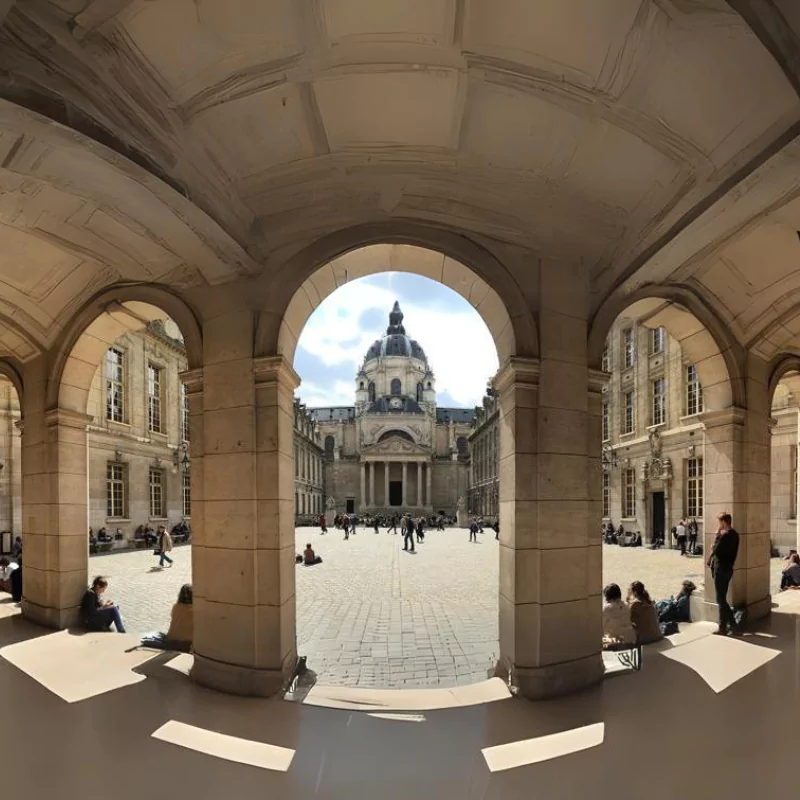
#63
QS World Ranking
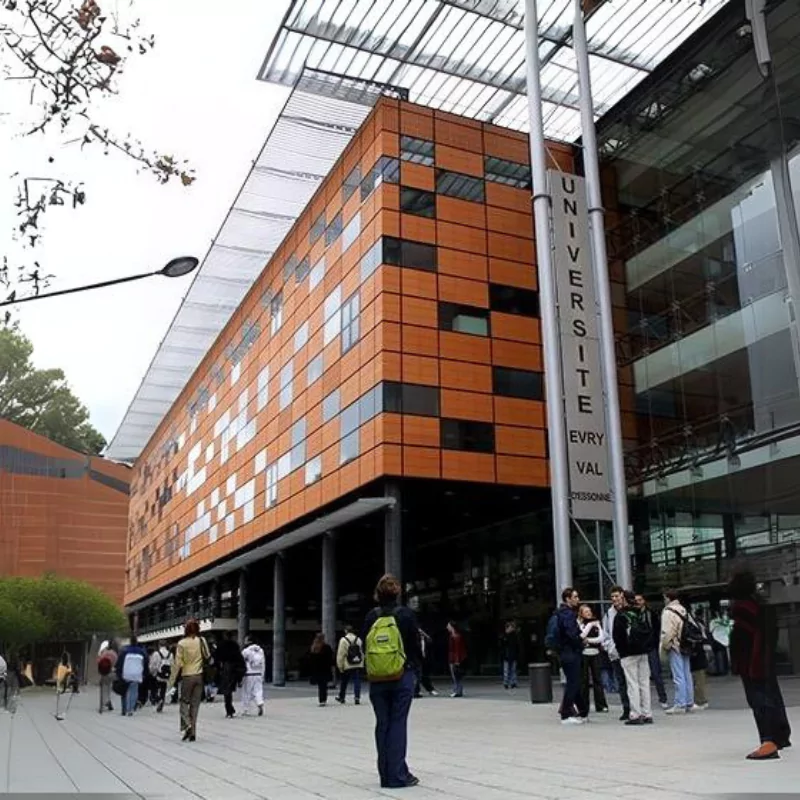
#73
QS World Ranking
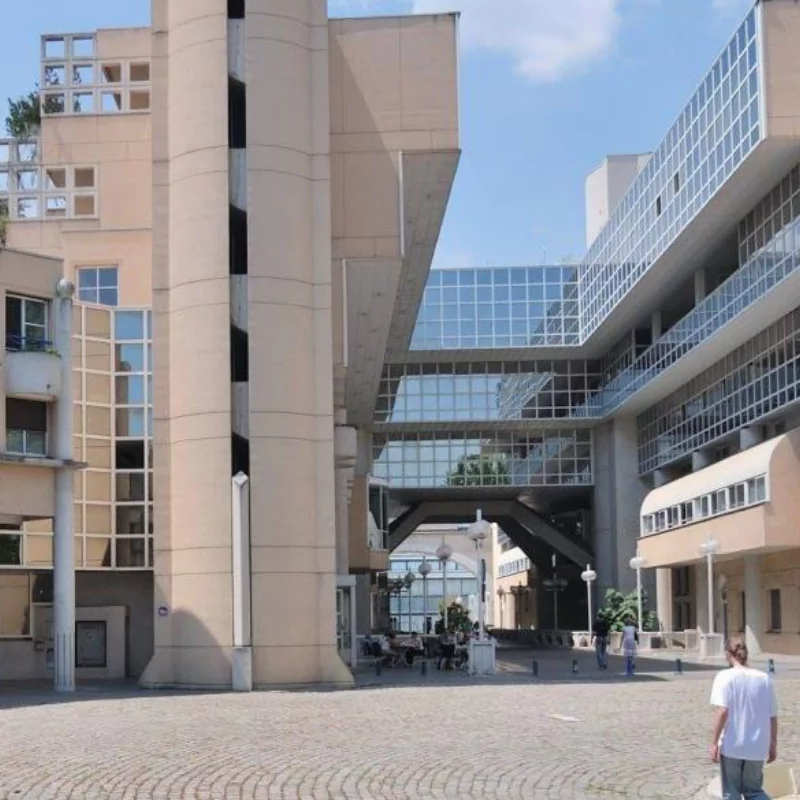
#187
QS World Ranking
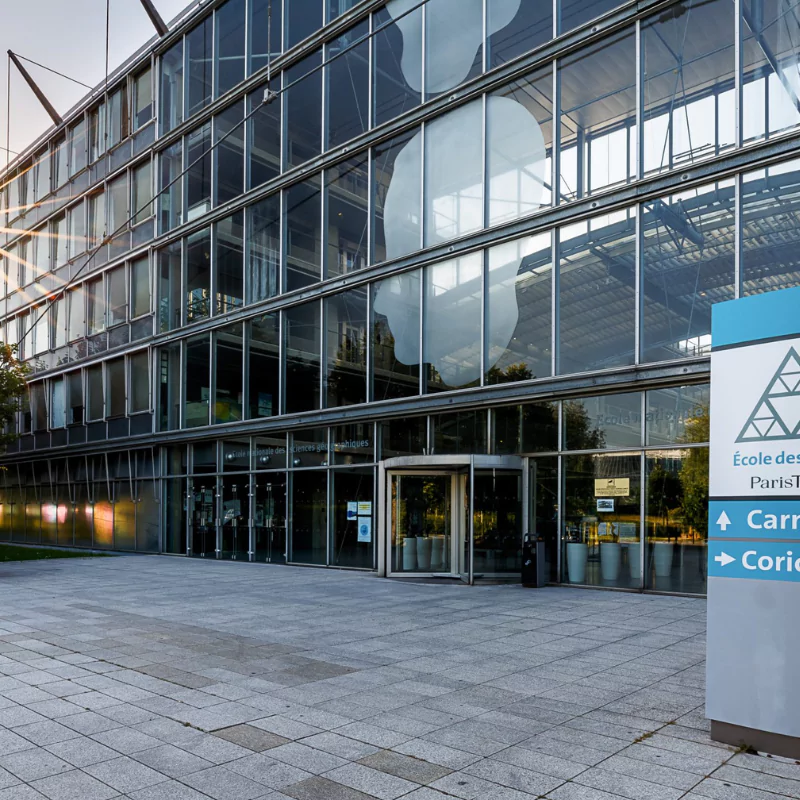
#205
QS World Ranking
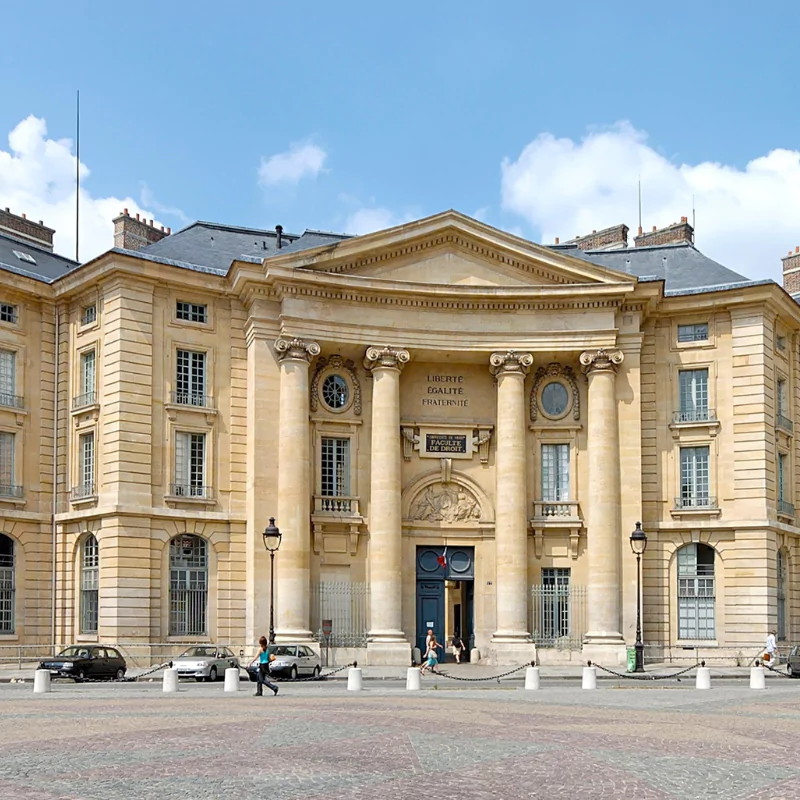
#283
QS World Ranking

#302
QS World Ranking
French universities welcome international students between September and January, usually in the spring, fall, autumn, and summer. Even within the same season, many French colleges offer various admission schedules. Here are some steps to follow to begin the application process.
Non-European students must pass the Preliminary Admission or "Demande d'Admission Préalable - DAP" before applying to French universities. They also need to apply online through Campus France.
You can reach out to credible study-abroad consultants or study in France consultants for application and student visa assistance.
Several admission requirements need to be fulfilled when you are applying to French universities. Such requirements majorly include documentation that needs to be filled and submitted within the deadline.
Some common eligibility requirements include:
French universities are open for two major intakes which are Fall & Spring. Both intakes have specific deadlines & admission criteria that the students/applicants need to fulfil to be eligible for that specific intake. You can go through the below section and check for the required details for different intakes.
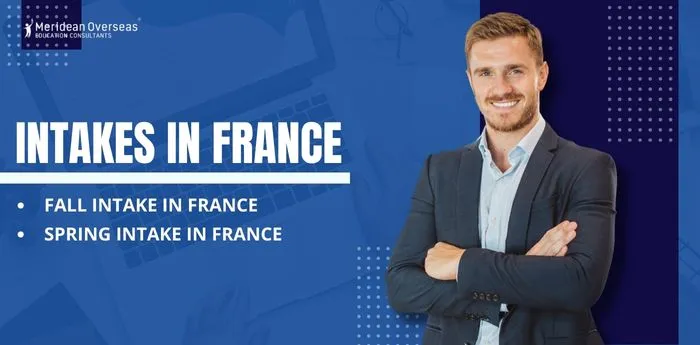
Connect With Meridean & Get Your Abroad Education Dream Fulfilled
As with any other study abroad destination, you must complete specific language competence assessments. This covers English proficiency tests like the IELTS, TOEFL, PTE, and TOEIC.
Apart from the English language competence exams, student applicants may need to write French language exams because many undergraduate courses are still taught in French. Students applying to study in France for these courses must complete French language examinations such as the DELF, DALF, TCF, and TEF and submit their results.
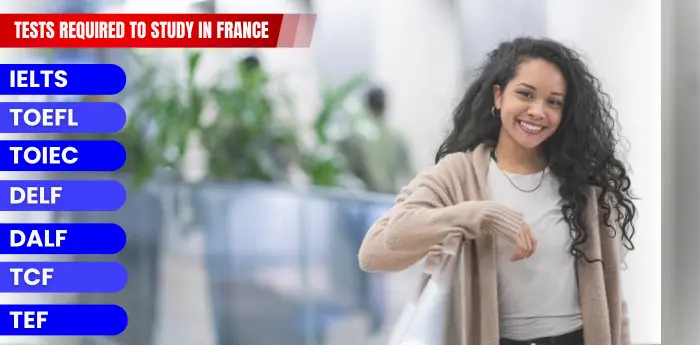
If you are an international student looking for programs to Study in France For International Students then you need to apply for a student visa. It acts as a permit that allows you to stay & study in France. However, there are different types of visas from which you can select a suitable one as per your study requirements.
If your study duration exceeds 90 days then you need to complete the Campus France Application before applying for French Student Visa. After form submission, the student is required to attend an academic interview with the Campus advisor from France, which is followed by an appointment with VFS-France.
Also, for a longer stay in France, the candidates or the international students are required to get their long-stay visa/residence permit (VLS-TS) validated within the initial 90 days of their arrival. Further, if a candidate has plans to stay even after the validity period of their VLS-TS then they are required to apply for a post-study work permit in France.
The best way to get your student visa conveniently is through interacting with the best study abroad consultants. They can help you better assess your eligibility & plan your visa application & approval accordingly.
Scholarships are a simple way for international students to pay their tuition fees to study in France. These scholarships either pay the cost of living or tuition or provide grants.
Here are some common scholarships that most overseas students apply for
| Scholarship Name | Amount/Covers/Benefit |
|---|---|
| The Charpak Scholarship Programme, |
|
| La Femis |
|
| The Erasmus+ Mobility Scholarships for International students |
|
| Emile Boutmy Scholarship 2020 |
|
| AIFS- General study abroad scholarships |
|

I applied visa for Australia through this website . Mr. Prashant &Mr. Prakash made the job hastle free for me. They were friendly, helpful & available all the time .My work is done in a smooth way & I highly recommend them. Moreover, you can book the free counselling session with them that give you the proper guidance to study abroad. I have no complaints and I am very grateful for the support 🙏

Meridean Overseas is best in Ahmedabad. Prashant Sir is very supportive and gives his best efforts for every applicant’s visa process. They have very good coordination with universities in Australia. I got Australia Dependant Visa today, so very happy for this and very thankful to Prashant Sir from Meridean Overseas, his work is best. I am extremely happy with the Meridean Overseas Education, Ahmedabad.

I would like to thank you very much for your time and support during my visa adjustment process and for helping me to obtain the desired outcome. I am also very thankful for your help in preparing me for the university interview which made the approval of my visa adjustment very successful. Best institute in India if you want to study abroad. I am personally thankful for SOMYAA KHANGAROT ma’am. She is very supportive and also motivates the students. Again thank you so much MERIDIAN Overseas and their team. ❤️💕

Vineeta, the stellar counselor at Meridean Overseas, made my study visa journey for New Zealand overseas education hassle-free. Actually i didn't put my file in merdian, but I put in another consultancy, they are not gave such support. Also, I am wroking person. One day I see Video in Instagram and contact to Meridian Overseas. about my visas queries and my visa slots. So they always help me in without any fees. On that day my consultancy didn't call me for the slot opening. But Merdian team call me for the slots and because of that I booked my slots.
So I Appreciate their work and Also, I recommend to my family member and friends.

First of all i would say full team of Meridean Overseas is very hard working generous and supporting people and my consultant Mr. Shubhang is very honest and very supportive person and while in the meeting. He told me each and everything clearly and nicely. I was really very impressed and got so many information during the meeting. And you all won't believe the meeting was absolutely free . You can also go and meet the team They are very friendly and clean as glass. If you are willing to go to abroad please consider them and give them a chance to consult you.

I had a wonderful experience with Meridean Overseas. My counselor's name is Miss Tanya Soni. She was incredibly helpful in every aspect, her guidance helped me a lot in understanding my process and solving my problems with the best possible solutions. I am very interested in studying in Poland, and Tanya ma'am helped me significantly, because of her guidance, my dream has come true. I'm very grateful for choosing a counselor from Meridean Overseas.

So far, my experience with Meridean Overseas has been truly remarkable. The experts at Meridean Overseas possess impressive knowledge and demonstrate a strong commitment to providing friendly service to their clients. My process consultant Miss Rashi, stands out with her profound understanding and consistent helpfulness. She is adaptive and ensures the completion of tasks in a timely manner. The team responds promptly to queries, and I am genuinely satisfied with the assistance received thus far. I have high expectations that the remainder of my visa application process will be handled with the same level of professionalism and efficiency.
Thank you, Meridean Team.

My experience with MOEC has been great. I would recommend MOEC for students who wants to pursue their further studies in abroad as their staff is extremely helpful and suggests the best. My counsellor has been really supportive throughout the entire process, from course selection to till visa approval. She always clarified my doubts and helped me in every single way possible and I highly appreciate it.
Ans. France is one of the few countries with low tuition fees. International students pay tuition fees ranging from 2,770 to 3,770 EUR in public institutions. However, tuition at private universities like Grandes Ecoles might reach 30,000 EUR per year. International students should budget between 1000 and 1600 EUR per year for living expenses.
Ans. International students wishing to pursue a UG or PG degree in France must obtain a long-stay visa. Applicants must submit the following documents:
Ans. The cost of living in France varies based on geography and lifestyle. Numbers indicate that the average yearly cost of living in France is between €1000 and €1500, which includes housing, food, transportation, and entertainment.
Ans. To apply to a French university. They must then fill out an application form, which typically includes academic records, a letter of motivation, and a CV. Students must produce language competence exam results and letters of recommendation.
Ans. The most common language competence test required for admission to a French institution is the Test de Connaissance du Français (TCF).
Some universities may also need additional language competency examinations, such as the International English Language Testing System (IELTS) or the Test of English as a Foreign Language (TOEFL).
Ans. The most in-demand jobs in France include
However, the job market is highly competitive, and finding work without fluency in French can be challenging.
Ans. Paris is France's most expensive city and the highest-paying city. Other cities, like Lyon, Marseille, and Toulouse, have lower living costs while still giving numerous work options.
Ans. France enables international students to work after earning their Master's degree. The qualifying candidates will receive a 5-year post-study work visa. To lure overseas students, France recently increased the validity of work visas from two to five years. This is the best option for students considering France as a study destination. France's 5-year post-study visa is precious for professional advancement.
Ans. The Campus France application method takes at least three weeks, but the Consulate application process takes at least two weeks. The application process must begin at least 90 days before the departure date. In unexpected delays, it is highly recommended that students begin the process as soon as feasible.
Ans. Only once you have received acceptance into a program at a French institution will you be eligible to apply for your student visa in France. To apply for your visa, you will need to contact the French consulate in your home country and provide them with the following when requested:
If you’re taking a French course, you’ll need proof of your French language proficiency.
Contact MOEC Experts for Study Abroad Guidance!
